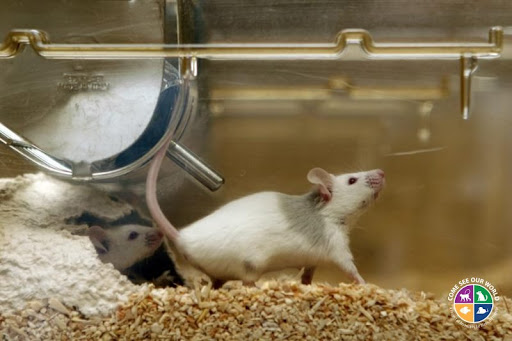As we say goodbye to yet another remarkable year, let’s take a moment to appreciate the wealth of knowledge acquired through the 2023 Allentown educational webinar series, skillfully moderated by Dr. Cindy A. Buckmaster – a seasoned expert with over 30 years in laboratory animal science. Driven by a profound passion for both animals and people, she champions transparency, reason, and compassion in her advocacy efforts. Our webinars have proven invaluable to the laboratory animal science community, delving into diverse topics ranging from AAALAC accreditation to the intricacies of occupational health programs.
If you missed any of our webinars this year, fear not, as it’s never too late to access them. All of our webinars are conveniently available on demand! Or, sign up and learn more about how to receive email notifications for our upcoming webinars in 2024. In the following sections, join us for a comprehensive recap, where we revisit the wisdom shared by laboratory animal leaders and specialists.
Allentown Educational Webinar: Managing People and Emotions in Laboratory Animal Science
In laboratory animal science, mastering the art of managing people’s emotions is crucial for fostering a positive and collaborative work environment. The nature of scientific research involving animals requires intricate teamwork, and understanding and addressing emotions can enhance communication and team cohesion. Read more to learn how laboratory animal experts manage difficult personalities, emotions, and people.

Working with Difficult Personalities: How to Survive and Thrive
In this insightful webinar, Laura A. Conour, DVM, DACLAM, and Pamela Straeter, MS, RLATG, CMAR, CPIA, delved into the challenges professionals face when dealing with colleagues or employees who present difficult personalities. With a candid and practical approach, the experts explored the emotional toll on individuals and workplaces. Plus, attendees learned strategies to navigate these challenging relationships and transform them into more constructive and positive interactions.
Conour and Straeter empathetically addressed the frustration and stress experienced by individuals dealing with troublesome personalities, offering tangible solutions. By posing questions such as, “Is it me?”, the webinar facilitates a deeper understanding of the dynamics of challenging professional relationships. The session empowered participants to take charge of their situations, providing practical insights on managing interactions in a way that not only preserves one’s sanity but ensures that encounters are constructive, productive, and structured.
To learn more, watch the on-demand recording now.
Allentown Educational Webinar: Embracing Our Emotions in the Workplace
Webinar led by Morag Mackay, V.N., Cert.Ed., RLATG, SRS, NCPT, spotlights the critical role of emotional management skills for leaders in the workplace. Mackay underscores the normalcy of experiencing a wide range of emotions at work, including frustration, anxiety, joy, and more. The session emphasized the pivotal impact of how leaders handle these emotions, asserting that their approach can either contribute to building up or wearing down employees. The central theme revolved around the need for leaders to develop the ability to regulate their own emotions and foster the emotional well-being of their team members.

The webinar discusses some practical aspects of achieving psychological well-being in the workplace without resorting to the “common” directive of “leaving your emotions at the door.” Morag Mackay focuses on leading teams with emotional intelligence, emphasizing the importance of cooperation, connection, and collaboration. The goal was to guide leaders in cultivating an emotionally healthy workplace, where understanding and managing emotions play a central role in fostering positive working relationships and overall team dynamics. The session provided valuable insights and strategies for leaders to enhance emotional intelligence and contribute to a more supportive and collaborative work environment.
To learn more, watch the on-demand recording now.
The Regulations, Policies, and Procedures for Caring About Your People
Jarrod Nichol, MBA, PMP, CLSSBB, led the webinar addressing critical but often overlooked aspects of the lab animal science industry — the well-being of front-line animal care workers. Despite the industry’s commitment to the 3Rs (Replacement, Reduction, and Refinement), constant refinement of practices, and exploration of new ways to enhance animal welfare, the presentation shifted to the caretakers themselves.
Highlighting a common disparity, Nichol emphasized that these front-line workers, who play a crucial role as the first responders for animal care services, are frequently among the lowest-paid employees within the organization. Despite their pivotal responsibilities in implementing changes in animal-related policies, handling emergencies, and working overtime, their compensation and recognition often don’t align with the significance of their role.
Nichol’s presentation offered practical insights into fostering employee engagement, providing a roadmap for organizations to implement quick wins that can significantly enhance the well-being of front-line animal care workers. To learn more, watch the on-demand recording now.
Words Matter! Advocating for Traumatic Compassion Dissonance
In our thought-provoking webinar led by Lisa M. Kelly, M.Ed., R-LATG, the crucial role of precise and conscientious language in discussing mental health challenges in laboratory animal science was brought to the forefront. Kelly emphasizes the impact of terminology on the public perception of the profession, particularly when addressing one of the most prevalent mental health issues that lab animal professionals face. The session underscores the potentially misleading nature of commonly used terms like “compassion fatigue” and their contribution to public misunderstanding and criticism. Kelly advocates for the adoption of more accurate and industry-specific language to articulate the nuanced mental health challenges associated with working with lab animals.

Kelly delves into the importance of developing and embracing precise terminology, proposing “Traumatic Compassion Dissonance” as a more accurate descriptor for the phenomenon. By carefully selecting words that better capture the complexity of the mental health challenges in the field, Kelly argued that professionals can contribute to humanizing these concerns within the industry. The webinar aims to encourage a shift in discourse and promote a deeper understanding of the psychological aspects of working with lab animals.
To learn more, watch the on-demand recording now.
Allentown Educational Webinar Series on Research Methods and Facility Procedures
Improving research methods is critical to science as it enhances the reliability, validity, and overall quality of results. Rigorous research methods ensure that experiments and studies produce accurate and reproducible results, reinforcing the credibility of scientific knowledge. Below, we cover our webinars that discuss essential topics for enhancing the reproducibility of lab animal research studies.
Improving the Reproducibility of Animal Studies – From Principle to Practice
Clinical trials often fail, influencing people to question how you can apply animal studies to humans. But figuring out how reliable animal studies are isn’t simple because many “positive results” come from methodological research mistakes, not because the treatments work.

The scientific community at large has named this a “reproducibility crisis.” Our webinar presenter, Nuno Henrique Franco, PhD, offers his unique perspective on improving reproducibility in biomedical research, emphasizing ethical laboratory animal care and refining scientific experiment design. What’s more, he provides insights into what causes these issues and offers solutions to enhance the future success of research.
To learn more, watch the on-demand recording now.
Does Your Occupational Health Program Need a Shot in the Arm?
In our webinar, “Does Your Occupational Health Program Need a Shot in the Arm,” presenters Timothy D. Mandrell, DVM, DACLAM, and Mildred Montgomery Randolph, DVM, DACLAM, dive into Occupational Health and Safety Programs (OHSP) in the laboratory animal sphere. Traditionally, there are many challenges with OHSPs in animal care programs across organizations. And simply having an OHSP isn’t enough; it requires careful planning and coordination from multiple parties to be successful.
Our presenters believe that the common OHSPs used today aren’t addressing the critical needs of the 2023 workforce. They explain that it’s essential for traditional OHSPs to undergo reevaluations – especially in organizations aiming to stay competitive and culturally relevant. Those involved in OHSPs must examine their programs, ensuring a comprehensive structure that benefits their organization.
To learn more, watch the on-demand recording now.
The Use of Performance Standards in the AAALAC Accreditation Process
Javier Guillén, DVM, Senior Director for Europe and Latin America at AAALAC International, delivered a compelling webinar addressing the critical intersection of legislation and animal care and use program areas worldwide. With his extensive expertise in the field, Guillén shed light on the stringent engineering standards that encompass measurable requirements, such as minimum cage dimensions, which are integral components of legislative frameworks globally.

One of the highlights of Guillén’s presentation was the emphasis on performance standards by AAALAC International and institutional animal care and use programs as a benchmark for excellence. Guillén’s discussion provided a roadmap for professionals and institutions either seeking accreditation from AAALAC or aspiring to enhance their animal care practices, offering a valuable example for adopting practical and ethical approaches.
To learn more, watch the on-demand recording now.
Allentown Educational Webinars on Animal Care and Husbandry Improvements
Elevating animal care and husbandry standards is pivotal for advancing lab animal science. In the forthcoming webinar recaps, you can expect to gain actionable insights and practical strategies to implement tangible improvements in these crucial aspects of research.
6 Simple Tips That Will Significantly Improve Rodent Surgical Outcomes
Webinar presenter Marcel Perret-Gentil, DVM, MS, focuses on six impactful tips for enhancing rodent surgical outcomes. The session proved valuable for diverse audiences, including principal investigators, rodent surgery instructors, veterinarians, technicians, and IACUC personnel.
The webinar’s learning objectives center on reducing postoperative morbidity and mortality, enhancing data yield following rodent surgery, and providing practical insights for implementing principles into a rodent surgical program. Attendees gain valuable insights that are directly applicable to their roles, contributing to a broader improvement in the overall quality of rodent surgical practices across various professional domains within the industry.
To learn more, watch the on-demand recording now.
What Type of Water Should Research Animals Drink, and Why? Allentown Educational Webinar
The webinar led by Robert C. Dysko, DVM, DACLAM, addresses a critical aspect of laboratory animal care, shedding light on the absence of engineering standards for the quality of drinking water provided to research animals. With no universal guidelines, individuals and institutions are responsible for the overall quality of drinking water based on various factors. These factors include species-specific differences, the health status of animals (e.g., SPF, immunocompromised, genetically modified), the quality and conditioning of source water, and the institution’s diverse methods to adjust drinking water before its final delivery.

The webinar offers valuable insights into the complex decision-making process surrounding drinking water quality for research animals. Participants can gain a deeper understanding of potential water sources. Dr. Dysko provides a comprehensive overview of available options and recommendations for treating and conditioning drinking water within an institution. The session aims to empower professionals in the field, allowing them to make informed decisions that align with the research animal’s specific needs and conditions.
To learn more, watch the on-demand recording now.
Allentown Educational Webinar: “Wilding” of Laboratory Mouse Gut Microbiota at GSU
In the webinar presented by Michael W. Hart, DVM, MS, DACLAM, and Rex A. Howard DVM, DACLAM, participants learned the intricate relationship between host and microbiome genes shaping the mammalian phenotype. The presentation highlighted the co-evolution of microbiomes in free-living organisms, such as wild mice and humans, over thousands of years, emphasizing the symbiotic nature of the host-microbe relationship integral to physiological processes.
In contrast, the laboratory mouse microbiome evolved under the controlled and sanitized conditions of research environments, lacking exposure to the diverse microorganisms in the wild. The session explored ongoing research at Georgia State University (GSU), focusing on the “wilding” of the laboratory mouse gut microbiota. The discussion covered the mechanisms employed in this process, the resultant shifts in gut microbiota and immune phenotype, applications of the model, and the challenges encountered while pursuing a more representative mouse model.
To learn more, watch the on-demand recording now.
Wrapping Up the 2023 Allentown Educational Webinar Series
The 2023 Allentown Educational Webinar Series has proven to be a remarkable journey through diverse and crucial realms of laboratory animal science. From navigating difficult personalities and fostering emotional intelligence in the workplace to addressing critical issues in occupational health programs and advocating for precise language in mental health discussions, each webinar has contributed significantly to the enrichment of laboratory animal science.
As we look back on the wealth of wisdom imparted, we carry forward a renewed commitment to excellence and innovation in advancing scientific knowledge and the welfare of research animals. Please stay tuned for our next webinar in January 2024!
Want to Read More About the 2023 Allentown Educational Webinar Collection? Check Out Our Blog!
We are committed to delivering concise and informative summaries of every webinar we showcase. We craft our blog stories to capture and highlight the most pertinent details at a glance, ensuring that our readers gain valuable insights without investing extensive time. These summaries distill the essence of each webinar, offering a snapshot of prime takeaways, significant discussions, and actionable points.
Connection Matters! Sign Up to Learn More About Our Webinars
Our webinar series connect global laboratory animal professionals from all walks of life and provide them with a space and a forum to discuss the latest topics, concerns, and trends in the industry with the leading experts in our field. So, why do we do this? You deserve connection, collaboration, and educational opportunities too. That’s why all our webinars meet AALAS and CALAS requirements for 1.00 hour of Continuing Education (CE) and can be used elsewhere (where accepted).

